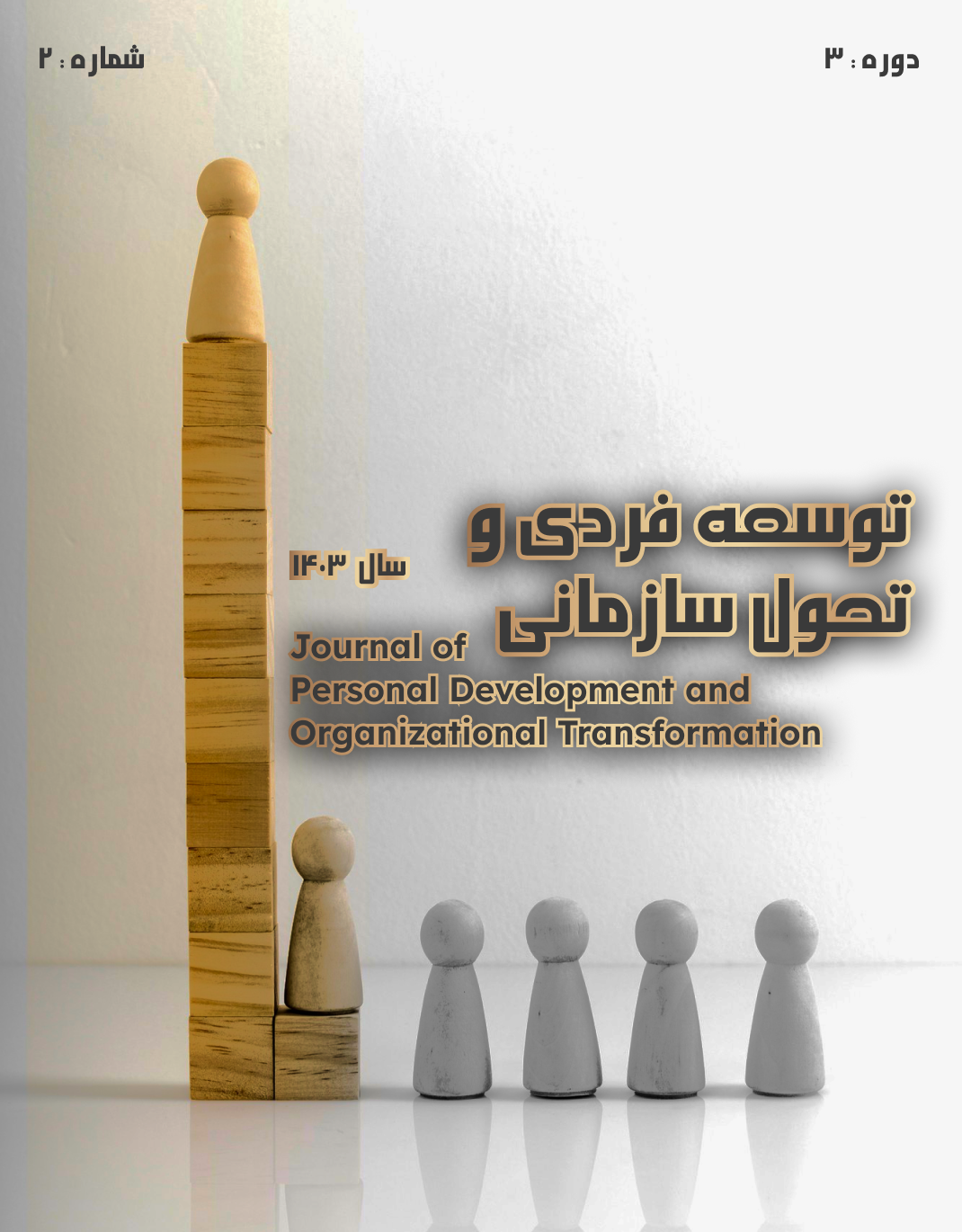The Effect of Psychological Empowerment on Teachers’ Job Performance: The Mediating Role of Professional Identity and Psychological Well-being
Keywords:
Psychological empowerment, job performance, professional identity, psychological well-being, elementary teachersAbstract
This study aimed to investigate the effect of psychological empowerment on teachers’ job performance with the mediating role of professional identity and psychological well-being. This applied, descriptive-survey study was conducted among elementary school teachers in Rudsar, Iran. A total of 384 participants were selected based on Krejcie and Morgan’s table through simple random sampling. Four standardized questionnaires were used to collect data: job performance, psychological empowerment, psychological well-being, and professional identity. The validity and reliability of the instruments were confirmed using factor loadings, Cronbach’s alpha, composite reliability, and AVE. Data were analyzed using Smart PLS software and structural equation modeling (SEM) techniques. The results revealed that psychological empowerment had a significant direct effect on teachers’ job performance. Furthermore, it also influenced performance indirectly through the mediating roles of psychological well-being and professional identity. All path coefficients and t-values indicated statistically significant relationships between the independent and mediating variables, and between mediators and the dependent variable. The GOF index confirmed the acceptable overall fit of the model. Psychological empowerment significantly enhances teachers' job performance both directly and indirectly. Accordingly, educational policymakers and school administrators should foster teachers' psychological, spiritual, and professional capacities to promote higher teaching performance.
Downloads
References
Abdul, B., Jing, Z., Wang, L., & Rabeeu, A. (2024). Assessing the Impact of Employee-Centric Digital Transformation Initiatives on Job Performance: The Mediating Role of Digital Empowerment. Strategic Management, 29(2), 5-18. https://doi.org/10.5937/straman2300057r
Asadi, P., Farhadi, H., & Golparvar, M. (2021). Effectiveness of Psychological Empowerment Package on the Psychological Wellbeing and Rumination of the Parents of the Children with Cancer. Empowering Exceptional Children, 12(1), 84-94. https://doi.org/10.22034/ceciranj.2021.246311.1443
Ding, J., & Xie, Z. (2021). Psychological Empowerment and Work Burnout Among Rural Teachers: Professional Identity as a Mediator. Social Behavior and Personality an International Journal, 49(6), 1-9. https://doi.org/10.2224/sbp.10241
En, W. C. (2023). Research on the Relationship Between Principal’s Transformational Leadership, Teachers’ Empowerment, and Teachers’ Well-Being. Ijer, 1(1). https://doi.org/10.33552/ijer.2023.01.000503
Fan, X., Zhao, S., Zhang, X., & Meng, L. (2023). The Impact of Improving Employee Psychological Empowerment and Job Performance Based on Deep Learning and Artificial Intelligence. Journal of Organizational and End User Computing. https://doi.org/10.4018/joeuc.321639
Hassard, J., Wong, I. L. K., & Wang, W. (2022). Workplace Empowerment, Psychological Empowerment and Work-Related Wellbeing in Southeast Asian Employees: A Cross-Sectional Survey. Health Promotion International, 37(4). https://doi.org/10.1093/heapro/daac113
Jafarzadeh, O., Elhaghlipour, M., Mehrandish, H., & Mirtajoddini, S. N. (2024). Investigating Fundamental Strategies for Improving Teacher Empowerment and Their Better Performance in Schools. Specialized Scientific Quarterly of New Research in Psychology, 5(2), 82-88. https://www.magiran.com/paper/2797521/
Lardier, D. T., Garcia-Reid, P., & Reid, R. J. (2019). The Examination of Cognitive Empowerment Dimensions on Intrapersonal Psychological Empowerment, Psychological Sense of Community, and Ethnic Identity Among Urban Youth of Color. The Urban Review, 51(5), 768-788. https://doi.org/10.1007/s11256-019-00504-7
Maarefvand, A., & Shafiabady, A. (2024). Effectiveness of Shafie-Abadi's Multidimensional Model Training on Enhancing Occupational Well-being and Quality of Work Life among Teachers in Qom City. International Journal of Education and Cognitive Sciences, 4(4), 21-30. https://doi.org/10.61838/kman.ijecs.4.4.3
Maden-Eyiusta, C., & Alten, O. (2023). Expansion-oriented job crafting and employee performance: A self-empowerment perspective. European Management Journal, 41(1), 79-89. https://doi.org/10.1016/j.emj.2021.10.012
Moayedimehr, M., Peymani, J., Ahadi, H., & Tizdast, T. (2023). Investigating the Impact of Psychological Empowerment Program Training on Marital Responsibility and Mental Well-being in Spouse of Addicted Husband. IJPN VL - 11 IS - 3 SP - 81 EP - 94. https://ijpn.ir/browse.php?a_id=2124&sid=1&slc_lang=en
Mojouni, H., & Rahimi, H. (2024). Investigating the relationship between digital leadership and creative performance mediated by psychological empowerment in teachers. Journal of Research in Educational Science, 18(64), 35-54. https://www.jiera.ir/article_198099.html?lang=en
Molix, L., & Bettencourt, B. A. (2010). Predicting Well-Being Among Ethnic Minorities: Psychological Empowerment and Group Identity. Journal of Applied Social Psychology, 40(3), 513-533. https://onlinelibrary.wiley.com/doi/abs/10.1111/j.1559-1816.2010.00585.x
Momand, Z., & Gul, S. (2023). The Impact of Knowledge Management on Organizational Performance With the Mediating Role of Psychological Empowerment. Kardan Journal of Economics and Manangement Sciences. https://doi.org/10.31841/kjems.2023.136
Niinihuhta, M., & Häggman-Laitila, A. (2022). A systematic review of the relationships between nurse leaders' leadership styles and nurses' work-related well-being. İnternational journal of nursing practice, 28(5), e13040. https://doi.org/10.1111/ijn.13040
Peng, S., Li, H., Xu, L., Chen, J., & Cai, S. (2023). Burden or Empowerment? A Double-Edged Sword Model of the Efficacy of Parental Involvement in the Academic Performance of Chinese Adolescents. Current Psychology, 43(4), 3786-3797. https://doi.org/10.1007/s12144-023-04589-y
Rahmawati, S. (2023). POS and Psychological Empowerment as Moderating Variables on the Effect of Job Insecurity on Employee Performance in Islamic Banks. Jurnal Manajemen Teknologi, 22(2), 124-134. https://doi.org/10.12695/jmt.2023.22.2.1
Shi, P., & Wang, J. (2023). The Impact of Customer Empowerment Behaviour on Service Workers' Craftsman Spirit: The Role of Professional Identity Enthusiasm and Perceived Organizational Support. https://doi.org/10.4108/eai.24-2-2023.2330681
Valeh, M., Shokri, O., & Asadzadeh, H. (2021). Effectiveness of mental empowerment training program on increasing teachers’ psychological capital and job-related affective well-being. Journal-of-Psychological-Science, 20(100), 579-596. http://psychologicalscience.ir/article-1-843-en.html
Zeer, I. A., Ajouz, M., & Salahat, M. A. (2023). Conceptual Model of Predicting Employee Performance Through the Mediating Role of Employee Engagement and Empowerment. International Journal of Educational Management. https://doi.org/10.1108/ijem-03-2023-0095
Downloads
Published
Submitted
Revised
Accepted
Issue
Section
License
Copyright (c) 2025 Masoumeh Taghavi Deylamipour, Samira Pali (Author)

This work is licensed under a Creative Commons Attribution-NonCommercial 4.0 International License.







